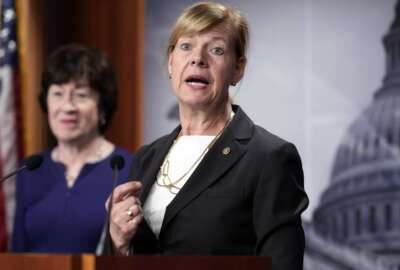Hubbard Radio Washington DC, LLC. All rights reserved. This website is not intended for users located within the European Economic Area.
Congress running out of time to pass priority bills
Lawmakers have about 23 real work days left before the end of the fiscal year to pass USPS reform, comprehensive cyber, DoD authorization and all the 2013 sp...
wfedstaff | April 17, 2015 3:54 pm
By the end of the week, the Senate is expected to have passed the Surface Transportation bill to go along with the Food and Drug Administration reauthorization legislation passed yesterday. But even with the passage of these two major bills, which President Obama will sign into law, several others are languishing on Capitol Hill.
With only 23 real work days left, Congress is running out of time to pass an assortment of critical bills from Postal Service reform to cybersecurity to fiscal 2013 spending bills. 
Add to the partisan rancor the fact that lawmakers are expected to work on legislation only for 23 of the next 96 days until Oct. 1 — taking away weekends, Mondays and Fridays, and the July 4th and August recesses — there isn’t a lot of time to find compromise on the bills, and hope is running out for the Postal Service, cyber experts and vendors who are unsure of how they can plan for 2013 and beyond.
“There is not a lot of interest in passing bills when both sides think they will be in better position come November,” Troy said. “It’s not the best way to run a railroad, but this is the way we are running this railroad.”
Baby steps on some bills
Congress has made some progress on all the priority pending bills — USPS reform, comprehensive cybersecurity legislation, the Defense Department authorization bill and 2013 appropriations.
The House has passed six appropriations bills and four others are out of committee and awaiting debate on the floor.
The Senate has passed nine spending bills out of committee, but it has not voted on any of them as a full body. 
“I think we are looking at something new and unique because we have a whole series of watershed issues that demand and will require congressional an administrative actions or the ramifications will be, in many ways, grave,” said Trey Hodgkins, senior vice president for national security and procurement policy at TechAmerica, an industry association. “Combined with that, the requirement that these important issues get attention and be addressed, you have the political atmosphere which is high-partisan and has stifled the ability to move a lot of these issues forward and certainly stifled the ability to find compromise. On top of that, you layer on the election politics, which can drive some behaviors that do not contribute to addressing these issues. That is why a lot of these things are being pushed off to the lame duck.”
DoD authorization lynchpin for other bills
He added the DoD authorization bill may be key to many of these priorities.
“I think it will probably end up looking like a Christmas tree because a lot of these other issues that are important to people and important to the legislators are not going to have the opportunity to move forward,” Hodgkins said. “They will not have the House floor time or calendar time so they will be looking for some other provision to move it forward.”
The most likely candidates include the Postal reform bill, the DATA Act and possible non-controversial parts of the cyber bill, such as the update to the Federal Information Security Management Act (FISMA).
It’s not unusual for Congress to attach unrelated bills to the DoD authorization package. The first version of FISMA and the Services Acquisition Reform Act (SARA) both passed that way.
Hodgkins said usually the DoD authorization bill takes a week to deal with the typical issues such as military personnel pay and benefits and acquisition policy changes. But if lawmakers add proposals that address cyber or USPS or the DATA act, a week would not nearly be enough. 
The Senate passed a USPS reform bill in April, but the House has not yet acted on it.
The House has passed several cyber bills and now is waiting on the Senate to act.
“There’s been a hardening of positions in both the House and the Senate, and a hardening of the opposition,” said James Lewis, a senior fellow and director of the Technology and Public Policy Program at the Center for Strategic and International Studies, referring to the delay in the cyber bill. “You have to ask what’s behind that? Some of it, of course, is we are in an election year and that does reshape things. And some of it is the heavy, heavy lobbying by companies against anything that would make them responsible for securing their networks.”
Cyber bill chances, now and later
He said the Senate will have two opportunities to pass their version, with the first coming after the July 4th recess. He said the lame duck session after the election will be the most likely way Congress passes the cyber bill.
Lewis said Congress has too many other priorities than cyber legislation despite the fact, he said, they understand the risks and threats the country is facing.
“The Postal bill needed to get done first,” he said. “And that one makes perfect sense. That politically is much more important for members. You can see why they put it at the top of the list.”
He said then spending bills will become the major focus of Congress and debate around sequestration and whether to continue the current set of tax cuts.
“If we are lucky, there will be a sweet spot where they can squeeze through a respectable cyber bill,” Lewis said. “I still think there is a chance for that.”
RELATED STORIES:
USPS moves ahead with closings, staff reductions
House-backed cyber bills head to Senate
DoD lectures Congress on budget ‘rules of the game’
Copyright © 2024 Federal News Network. All rights reserved. This website is not intended for users located within the European Economic Area.
Jason Miller
Jason Miller is executive editor of Federal News Network and directs news coverage on the people, policy and programs of the federal government.
Follow @jmillerWFED





